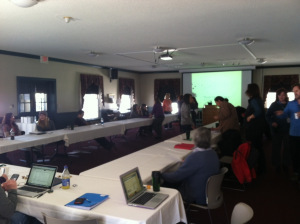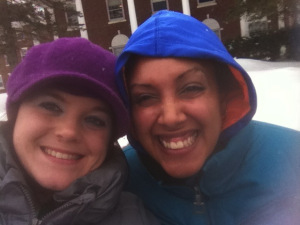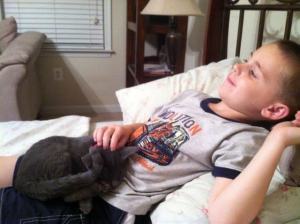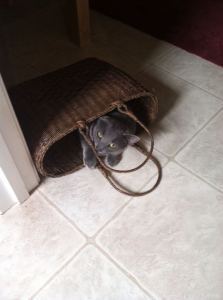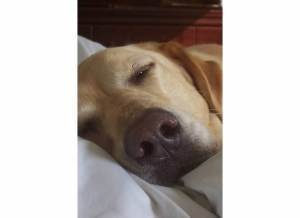Kelly Fiore Stultz's Blog, page 4
April 16, 2014
Today’s Rom-Com Tribute: Clueless
“Clueless” (1995)
This updated version of Jane Austen’s “Emma” gave us Cher Horowitz in all her plaid-skirt-wearing, as-if-ing glory. And Brittany Murphy was never better than when she played Tai, an endearingly hapless new student whom Cher insists requires a makeover.

(Original Content courtesy of The Huffington Post)
March 30, 2014
JUST LIKE THE MOVIES gets Kirkus-ed!
The first trade review for JUST LIKE THE MOVIES is in — and it’s a great one! I’ve gotten some really nice reviews, but this is the second positive review Kirkus Reviews has given my books and I would be lying if I pretended that didn’t thrill me. It totally does.
The review is live today on the Kirkus Reviews website and will be in the 4/15/14 review issue. Here’s the full text of the review:
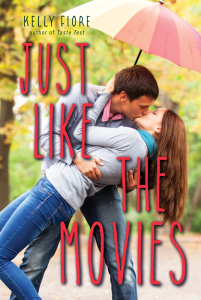
Perhaps you might consider pre-ordering this lovely novel that Kirkus dubs “an enjoyable read”… 
JUST LIKE THE MOVIES
Author: Kelly Fiore
Review Issue Date: April 15, 2014
Online Publish Date: March 31, 2014
Publisher: Bloomsbury
Pages: 288
Price ( Hardcover ): $17.99
Publication Date: July 22, 2014
ISBN ( Hardcover ): 978-1-61963-354-4
Category: Fiction
When Marijke the jock and Lily the nerd join forces to fix their love lives, Fiore lets her fangirl flag fly.
Marijke’s relationship with rocker Tommy is about to implode, and Lily’s liaison with motocross biker Joe has barely gotten off the ground. A twist of fate brings the two girls together at a screening of Titanic, and the duo are inspired to mend their romances with moves taken out of the chick-flick playbook. The ensuing stunts and grand gestures act as markers toward a Better Understanding of Love, a lesson Fiore doesn’t oversell. Sure, the lesson’s important, but the author is much more interested in giving readers a good time, at which she succeeds. Strong characterization and smart, sarcastic quips move the novel along. The author exhibits her knowledge of the teen-movie genre without getting too reference-heavy or inside-baseball. Most importantly, these characters are just plain likable. They’re complex and interesting, and earned sympathy goes a long way toward making the book such an enjoyable read.
A sugary romance light on depth but big on charm, Fiore’s sophomore novel is a solid entry in the genre it clearly loves.
So….this is me. :)

March 23, 2014
VCFA (Vermont College of Fine Arts) Writing Retreat – Winter 2014
There is never, ever a time when you’ve learned enough about writing.
This weekend, I had the pleasure of attending a writing retreat at the Vermont College of the Fine Arts in Montpelier, VT. A writing retreat is very different (in a good way) from a conference. A conference is usually more business related than craft related. I like talking business, but when it comes to taking time out from my life to do “the work,” I would prefer to be writing above all else.
Justina Ireland, an amazing YA author with supa-swagger, and I drove up from MD/PA to Vermont on Friday. Since then, I’ve made some decent headway in two chapter revisions and, after I’m done writing this post, I’m going to start to draft another chapter. That’s pretty good for a weekend! Granted, there’s a lot of social interaction — and I don’t get a lot of that at home, so I really enjoy that aspect. I feel a little less like a hermit that way. 
There were some really thoughtful presentations (like the one above by an editor) but the most valuable time, for me, was the writing time. In fact, that’s why I came here this weekend and I feel really satisfied that I’ve gotten a lot out of that. The focus without dog/boy/husband/life/television, etc. has been great. Now, honestly, I really did come into this thinking “I WILL WRITE ALL THE WORDS!!!” over the course of three days. And I certainly haven’t. But I have made some already written passages feel better, and I am happy with that. For now 
Not to mention — and these pictures TOTALLY don’t do any justice to it – but Vermont is just beautiful. I can’t wait to come back in the fall. Or next week.
And, I got to hang out with this girl, which was great! 
March 16, 2014
The Query Process – Part Two

I’ve already addressed this HERE but there was a discussion about querying over on the The Lucky 13′s message boards and the advice was stellar — so I figured I’d pass it along to you.
If you are interested in publishing in any respect (fiction, non-fiction, etc.) you’ll need to craft a kick-ass query letter. The query letter is your first impression. It’s your chance to wow a potential agent.
I was never all that worried about querying. Looking back, it’s probably why I got so many rejections  . And, of course, I wish I’d had all of the advice I’m about to give you!
. And, of course, I wish I’d had all of the advice I’m about to give you!
Without further ado, with credit to the authors who have provided it, here are some tips. Click on the titles of their books to read more about them (and, of course, buy the book if you are so inclined.)

Demitria Lunetta, Author of IN THE AFTER
“Writing a query is harder than people think. I would stress that it’s so important to take your time to get it right. Don’t bang it out in an afternoon. Read other people’s query’s. Write a draft, then revise, revise, revise. If you have a bad query, no one will ever look at your awesome MS.”
Karen Akins, Author of LOOP
“I found Elana Johnson’s ebook “From The Query To The Call” very helpful. She gives good, actual examples of queries that worked & WHY they worked. and she also talks about navigating “the call.” She was charging a nominal fee back in the day, but it might be free now.
Also, I never put the agent’s email address into the “To:” line until I was absolutely sure I was ready to send it. Just in case Gmail (or my brain) glitched.”
Rachele Alpine, author of CANARY
“This comes before the query, but when I was looking for agents, I used the back of books I loved and the author’s acknowledgements to find out who their agents were. I queried agents of authors that I really liked, because they had similar taste as me. There are so many agents that it can be hard to decide who to query and who is the right fit for you, so this was a good way for me to start looking.”
Cristin Terrill, author of ALL OUR YESTERDAYS
“Have a dedicated email address for querying (that sounds professional, not like your AIM screen name from high school) and give yourself set times a day to check it, or set up a rule in your mailbox to divert any query responses to a specific folder. That way you won’t jump every time your email dings.
Query in batches and save your top picks for a later batch in case you discover something in your query isn’t working.
Make super, super sure you follow the agent’s querying instructions exactly. I used a spreadsheet to make sure I was getting it right as well as tracking responses.”
Stephanie Kuehn, author of CHARM & STRANGE
“I had one question that no one could really answer for me, so ultimately I answered for it myself: if you need to spoil the ending to your book to get across why the book is an interesting one, then spoil it. (as in, imagine you’re pitching The Sixth Sense to agents: tell them the twist…that’s what’s compelling.)”
Chelsea Pitcher, author of THE S-WORD
“1. Test out your query on readers/writers. Evil Editor is my favorite site, because it’s like Query Shark, except he critiques EVERY query.
2. Don’t send “practice queries” to agents you don’t really want (or who aren’t near the top of your list), because what if they offer, and then you don’t have time to query the ones you really want?
3. NEVER OFFER EXCLUSIVITY (unless you feel you absolutely have to). Most agents don’t require exclusivity anymore, or actively speak against it, but for those who request it, they’re generally more than willing to waive it if other agents are reading the MS.
4. The best time to inform interested agents that others are reading your full is when you are sending a full to them.
5. If you get an offer of rep, email everyone who’s reading a partial/full and let them know. Generally you give them a week to respond and then make your decision.
6. I like to tailor my query to each agent, if they have specific likes: i.e., some like to know why you’re querying them, some would prefer you get right down to business. And, say I had a MS that walked the line between urban fantasy and paranormal romance, I’d choose which genre to use in my query based on the agent’s preference.
7. Do not just pay attention to what an agent reps. Pay attention to what an agent’s SOLD. We may be artists, but this a business, and you don’t want to find out your dream agent, who you super click with, is unable to sell your type of MS or just mass-submits to editors hoping something will stick.
8. This might sound a little crazy, but if somebody offers and you don’t have a great feeling about them (and maybe you have some info to back that up, like mediocre sales, or unhappy clients who left the agent), you don’t HAVE to sign with them. Listen to your gut. (And maybe have some info to back that gut-feeling up)
9. There are things about the querying process that you can’t control. Focus on the things you CAN: writing, rewriting, and RE-rewriting that query, getting feedback, and doing lots of research about agents. The rest is up the Query Fairy.”
Amie Kaufman, author of THESE BROKEN STARS
“Another huuuuge vote for From The Query To The Call. I completely learned to write pitches from that thing.
I would also add: DON’T PANIC. I accidentally sent a query to one of my dream agents attaching — I don’t even remember. 20 pages instead of 50, or forgetting to attach, or something. My heart totally stopped right after I hit sent, when I realised. But here’s the thing — I followed up with a quick ‘oops, sorry!’ email and it made absolutely no difference. When querying it can feel like everything’s life or death, but it’s really not.
Further: Be courteous when turning down agents, if you have more than one offer, and be equally courteous if you withdraw queries from those who haven’t yet responded, once you’ve accepted representation. I can tell you from personal experience that you never know when you’re going to end up dealing with them in some other capacity, and it’s always nice to have been nice, when that happens!”
Lydia Kang, author of CONTROL
“Leave these things OUT of your query:
1. This is the first novel you’ve written, or tried to query
2. Why your novel is going to make the agent big bucks
3. Why your novel would make a great movie
4. A very long bio.
5. Your history of self-pubbed novels, unless they’ve sold a lot of copies (I can’t remember the number on this, but I think it’s 20K or 25K copies in 6 months?)
6. Demands of any sort.
Things to include:
1. A pitch thats no longer than 400 words. I think 250-300 is the sweet spot (but that’s negotiable).
2. Writing relevant bio stuff (member of SCBWI, or RWA)
3. Thankfulness for their time and consideration.
4. The agent’s properly spelled name. No “To whom it may concern” or “Dear Agent”
Oh! Also, check your spam folder once in a while. I had a few full requests in my spam folder!”
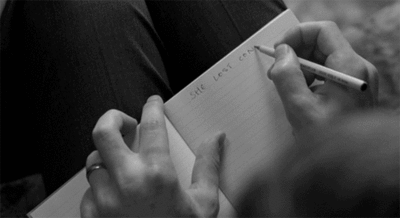
As you can see, these are GREAT tips. To expand on what was highlighted above, here are some links to help you out.
The book, FROM THE QUERY TO THE CALL by author Elana Johnson was mentioned by more than one author above. Click on the title for a free download of the e-book.
QUERY SHARK and EVIL EDITOR are the blogs Chelsea Pitcher mentioned that critique queries. They show you the good and the bad, so it’s worth a look to see what the difference is.
My agent, SUZIE TOWNSEND, has a fantastic blog that looks at successful queries, the submission process, and a ba-jillion other topics of interest in publishing.
More questions? Leave them in the comments below!
*ALL GIFS COURTESY OF GIFY.COM*
March 13, 2014
And you’re using that degree for what exactly?

I have to write bios pretty often. Not long ones — just a handful of sentences. I always, or almost always, start out with “Kelly Fiore has a BA in English from Salisbury University and an MFA in Poetry from West Virginia University.” I’m not sure why I started writing that. I think when I was in grad school, all the bios I read for authors started that way, so I’ve just modeled it.
But do my degrees really define me? When I tell people about myself, are my degrees what I want to lead with?

I was reading an article, and subsequent feedback articles, about a creative writing professor who believed writing couldn’t be taught and that the majority of his creative writing students weren’t talented. I think people have a lot of opinions about whether or not art can be taught. I would argue that there needs to be a general knowledge or base for that skill to be improved upon through education. I have always been a writer. But I haven’t always been a good writer. All of the skills I’ve acquired have been a result of the classes I’ve taken in college and graduate school. They made me the writer I am now.
So, do I use my degree/s? Absolutely. Every day. But I became curious about other people — specifically other writers I know. Do they all have degrees? Do they use them?
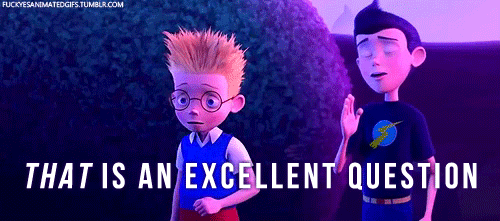
To find out, I ran a (very very informal) poll on the Lucky 13′s message board. You’ve heard me talk about the Luckies before — it’s a group of 2013 debut authors. I adore them.
Anyway, the poll ran for about 3-4 days. Here are the results:
Out of the 29 participants…
1 – No degree
1 – AA
27 – BA/BFA
6 – MA
6 – MFA
3 – PhD (including candidates)
1 – MD
1 – JD (law degree)
Note: Many people have more than one degree – i.e. a BA and an MFA/MA and some people have three degrees.
English Related Majors: 18
Non-English Related Majors: 11
So, about 2/3 of people majored in English or English-related fields. Does that mean they use their degree? Maybe. I didn’t ask for specifics. But what I find more interesting are the 1/3 of people who majored in science or business, etc. and who are still incredibly successful writers. Which proves a theory/concept English teachers have been trying to prove for, well, ever.
Writing is not an English skill.
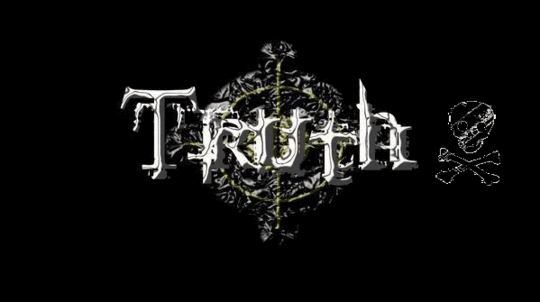
To be a good writer, you can come from any kind of background — many degrees, no degrees, doctors, lawyers, students, etc. It’s easy to say that writing is English related in scope, but you can be a true, talented writer – or storyteller, which sometimes is even more important – without ever having what is considered a traditional background.
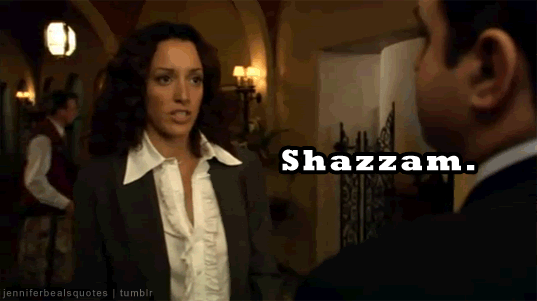
So, if you want to write, that might just be enough to gain momentum. I would argue that you should take classes or workshops. You should work with other writers and you should read a lot. I wouldn’t try writing in a bubble because you will never grow or improve. But you don’t need a degree to do it.
*All Gifs from PhotoBucket and Tumblr*
March 3, 2014
#mywritingprocess blog meme
Thanks to Emma Pass- author of ACID and THE FEARLESS- for tagging me into the #mywritingprocess meme. Writing is such a personal thing. Every author does it differently and trying to explain it sometimes makes people a little confused or concerned for your sanity/safety/well-being.
So, here is my writing process, complete with gif explanations.
1. What am I working on now?
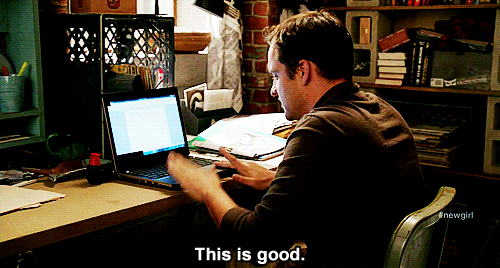
(This gif is courtesy of the YA Misfits, who are awesome and you should totally check them out.)
I always have a handful of irons in the fire. There are the book ideas that are constantly brewing and the books I outline to get a sense of how I’d write them and how they’d play out. Then there are the books I’m actually full-on writing.
I just finished a YA contemporary that is with my agent now and I’m waiting on edits for THE PEOPLE VS. CECELIA PRICE from my editor at HarperTeen. Beyond that, I’m drafting a new book that is a big endeavor for me and the drafting is going very very slowly. I usually write a book in 3-4 months, tops. This one is going to take awhile. It needs research, which is time consuming itself, and I feel like the process of writing a book that takes place during two different time periods (which this does) and involves a dual narrative (which this has) just takes more care and finesse than the average book. So, it’s slow going, but hopefully that means it will be great when all is said and done.
2. How does my work differ from others?
I am utterly amazed with other people’s writing processes (processi?) because they are all so vastly different. There are the people who write every day at the same time. There are people who aim for word counts. There are people who only write during the summer. There are people who are more “when the mood strikes me” kind of writers.
When it comes to the actual results of my writing, I think that I’m different from other writers because of the stylistic choices I employ. My world-building isn’t as involved as other authors and I am always amazed and semi-jealous when I read a great fantasy/paranormal/sci-fi book with a world I never could have imagined. That kind of thing just blows my mind. Where do they come up with that?

Anyway, I like to use a multigenre approach. I’m not that great at just writing chapters in order. In TASTE TEST, I had recipes, emails, texts, judges notes, interviews, and chapters all blended together. It broke up the narrative and told the story in a way that felt a little more natural to me.
In JUST LIKE THE MOVIES, I used a dual narrative — two characters talking from their own perspective — and that was a really interesting experience, too. I would argue that that book was the hardest for me to write, in that I have a really distinct voice and it was hard for me to create two different perspectives that didn’t sound really similar.
THE PEOPLE VS. CECELIA PRICE is a completely different animal. It has three narrative strands — a present day strand, a past strand from about 3-4 months before the present, and a memory strand. The memories are recalling times from many years before the present. They alternate in order (Present, Past, Memory, Present, Past, Memory, etc.) so that they’re easier to keep track of. There aren’t any chapters, per se, and the memory sections are really short — only a page or two at most.
So, when it comes to an end result, I like to attempt to put in a narrative structure that is interesting and non-traditional. This is both for the reader and for me as a writer.
3. Why do I write what I do?
Hell if I know. I literally have no clue where my ideas come from.

No, seriously, I really don’t know why the stories I write speak to me. Usually I think of characters or end results. General plot points. A moral or lesson. I can build a narrative around that.
Sometimes I start with a theme — I knew TASTE TEST would take place during a teen cooking competition, so that was a plot point I focused on. That book couldn’t exist without that detail. Also, I believe that YA is the most visceral and emotion packed genre that exists. As a writer who thrives on emotions, that’s something I take advantage of a lot. I don’t know if I’d be able to write nearly as well if I knew it was for an intended audience other than teens.
4. How does my writing process work?
You know, I’m going to rely on gifs for most of this one…
So, I come up with an idea or get struck with some kind of inspiration. It’s usually while I’m driving, interestingly enough.

Then, I write a synopsis. This is HARD. It’s usually 2-3 pages long and it tells the whole story, beginning to end, but with less detail than an outline would.

Then, once I’ve come up with a synopsis that actually works out — and that takes a while, believe me — I will do a really thorough outline. Chapter by Chapter (even if I don’t end up writing chapters exactly, I usually call them that at first) and I put down everything I think that will happen. These aren’t usually in complete sentences or anything, but I list a lot of things so I can plot out the trajectory of the story.
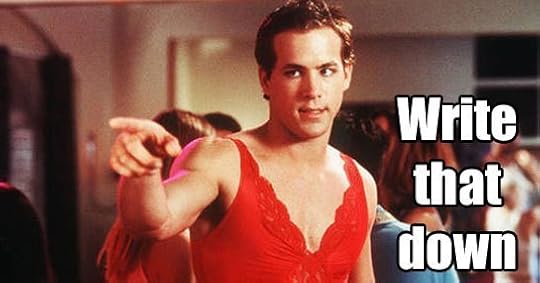
(I know that’s not a gif, but totally worth a look, don’t you think?)
So, here is where things get complicated…
I’m usually super driven and excited when I get to this point. I’m ready to go balls to the wall and write ALL THE THINGS.



But.
BIG BUT.
Sometimes I just can’t make that happen. It’s not that I don’t want to. It’s not like I don’t have ideas. But there are days when I sit in front of the computer and I can not transfer those ideas to the screen.
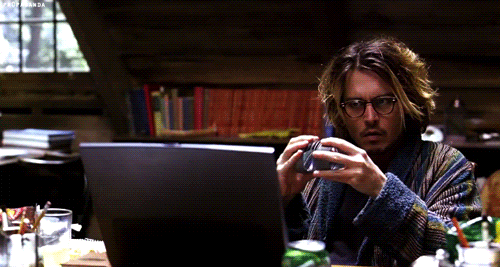

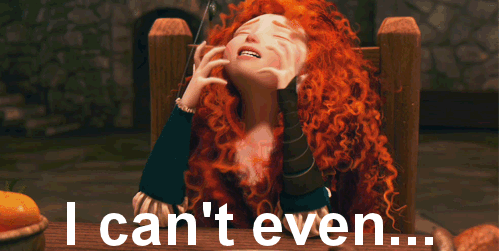
It’s the single worst feeling ever. The entire book is in my head. Sometimes it’s already written in my head, but it won’t come out until it’s ready. Kind of like a baby. I’m not kidding.
But the opposite happens, too. There are times when I write from the moment I get up until the moment I go to bed. And those are the BEST. And the worst, because I forget to eat and I stop communicating with my loved ones and I get so preoccupied that I can barely function like a normal human. But I still love it. I still want it to happen all the time.

Writing is my first love. I fell in love with it long before I met my husband or my little boy and, while I love them more than anything else – even more than writing — writing does have its moments where it comes first because it has to. If I don’t get a story out of my body, it’s like living two lives simultaneously.
And now you know why people think describing my process sounds crazy. 
And now, I’ve tagged the following writers to continue with the meme, so check out their writing processes in the coming days.
Ryan Dalton: www.ryandaltonwrites.com
Melissa Lenhardt: http://www.stillwatertexas.com
Karen Bao: http://www.karenbaobooks.com
*All gifs courtesy of Google Images*
Frederick Restaurant Week 2014: Firestone’s & The Wine Kitchen
Frederick Restaurant Week has begun!
For the last two years, I’ve had the privilege of attending a Restaurant Week “Sneak Peak” — this involves a sort of walking tour of Downtown Frederick, Maryland. The restaurant scene in my hometown has exploded in the last decade and there are at least a dozen restaurants I frequent in the downtown area.

Image Courtesy of Google Images

Image Courtesy of Downtown Frederick Partnership
After tasting the food and talking with fellow critics, writers, and foodies, I’ve narrowed my two restaurant choices down to Firestone’s and The Wine Kitchen. Not only am I recommending them to you, but they are the two places I’m going to go during Restaurant week this year, too.
Firestone’s Tavern
When we were being seated in the upper level of the Firestone’s dining room, I joked that I know at least five people who met their husband or wife at this popular bar. This was really only a semi-joke — I really do know a ton of people who met and started dating here.
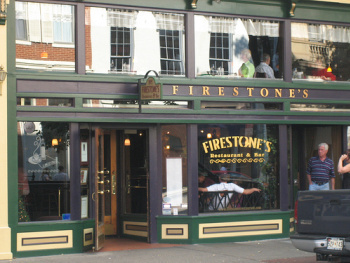
Image Courtesy of Lunchinout
This is the second year in a row that I’ve gotten to eat at, then rave about, Firestone’s during Restaurant Week. Last year they were one of my favorite’s, too, and they didn’t disappoint this year. If anything, they upped the ante.
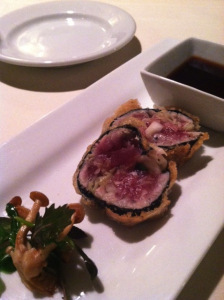
Tuna Tempura Roll with Kimchi, Ponzu Sauce, and Mushroom Salad
We started with wine (I had a glass of Riesling) and then moved into this lovely appetizer, a Tuna Tempura Roll with Kimchi, Ponzu sauce, and Mushroom salad. This had a lovely, slightly fermented flavor. Even sushi-phobes would try this, as it’s lightly fried on the outside. I actually liked the roll without the provided sauce.
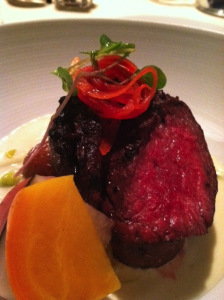
Beef with Creamed Leeks and Pickled Vegetables
I never knew I wanted Creamed Leeks until I had them. Yowza, were they good or what? The pickled veggies add a light sourness that complimented the beef. The beef itself was a little tough and hard to cut, but the flavor was excellent.
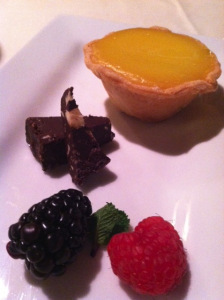
Lemon Tart with Chocolate Crunch
I *LOVE* simple desserts. People can overdo this final sweet course. Most people do overdo it. I’m not saying there isn’t a place for cheesecake or brownie sundaes, but after a rich meal like this one, a tart lemony curd inside a flaky homemade crust, with a small but delicious chocolate candy/brittle type of thing was an excellent end to the meal. It both cleansed my palate and satisfied my sweet tooth.
The Wine Kitchen
Everyone I’ve ever talked to about The Wine Kitchen LOVES it and I couldn’t wait to try it myself. I certainly wasn’t disappointed and I’m kicking myself for not going there sooner.

Courtesy of Leesburg Today
We began with a white wine once again — this time, we were given a card describing the wine itself, which is apparently a Wine Kitchen signature move. We had two courses at the Wine Kitchen. First was a Butternut Squash Carpaccio and Microgreen Salad.
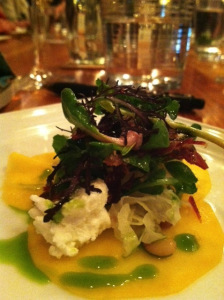
Butternut Squash and Microgreen Salad
The butternut squash is at the bottom — here, it almost looks like a sauce on the plate. Goat cheese, fennel, and a light dressing complimented this simple but delicious salad and it was a great way to begin (especially since I’d just had some fairly heavy food at Firestone’s.)
Next was the Sea Scallop with Red Risotto.
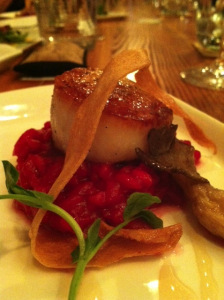
Sea Scallop with Red Risotto
Full disclosure? I hate risotto. It’s a texture thing. I don’t know why. The flavor here was good — earthy and kind of beet-y. But I didn’t eat it. It wasn’t the fault of the restaurant, though, and everyone raved about it.
The scallop, however, was incredibly delicious. I’m a sucker for a good seared sea scallop. The mushroom and pancetta garnish was also quite good.
So, if you can only go to one place for restaurant week, I encourage you to try Firestone’s or The Wine Kitchen — and if you can swing it, try both! You won’t be disappointed.
For more information about Frederick Restaurant week, check out their website at www.frederickrestaurantweek.com. You can also follow the hashtag #FredRestWk on Twitter, or check out the profiles and feeds of @FredRestWk and @DwntwnFrederick.
Happy Dining!
March 2, 2014
The Most Important Person in the Room
Something I like to do when I’ve got some extra time is go back through the YA Highway Field Trip Friday posts. I love them. They’re always chock full of interesting information and entertainment. They keep me posted on things I may have missed in the industry otherwise.
So, I was going back through these posts tonight and, on the December 20th post, I found a link to a Pub Crawl post by Joanna Volpe about Query Dos and Don’ts. Joanna is an incredibly successful agent (and the founder of New Leaf Literary Media, my agency) so I clicked on the link to her post. It was brilliant, as expected and had a lot of valuable information.
And then I decided to read the comments. I don’t know why I do this.
There were people asking really intelligent questions, and then there were people who, for lack of a better term, had an extremely inaccurate opinion of what agents do. They also had an incredibly inaccurate vision of what self-publishing will guarantee them.
There were many comments that started getting my back up, but this one pushed me over the edge:
“At that point, an agent would have to bring a lot to the table in order to be worth their 15%–Hollywood connections, for example, or foreign sales experience in fifty different countries. And of course, they’d have to be able to negotiate a print-only deal, because if I was making upwards of $1,000,000 per year in ebook royalties (on one title alone!), no way would I bend over and let a traditional publisher take that away.”
Okay.
Hold on for one hot minute.
First of all, as I say to my son, tone is everything. Starting out condescending and combative isn’t a recommended tact to take. But, more than that — where in the world are you getting that $1 M figure? Is this an Amanda Hocking commentary? Because, if that’s the case, you are missing the whole point. THE WHOLE POINT. Of traditional publishing. Of self-publishing. All of it.
The point of getting an agent isn’t about sales or rights or connections. It’s about support.
Yes, those sales and rights and connections are factors in how they support you. But the reason you get an agent is to have someone in your corner. Someone to help you navigate a business that, frankly, you know nothing about if you are counting on getting $1 M self-publishing one book.
Anomalies aren’t what built publishing. The midlist is. All of those authors who are writing while having day jobs or who are pumping out books that sell moderately well are the reality. The huge success stories are phenomenal and great to hear about because it means books are still selling and we haven’t lost an art form to technology. But those success stories aren’t the rule. They’re the exception.
So many comments on this blog post used the exception to give reasons not to sign with an agent. And every single one had to do with money.
Two examples -
“What is the standard royalty rate for a writer who signs with them? If a writer self-pubs on Amazon she gets 70 %, so selling 50k a month can net a middle class salary in that one month even if she sells at the lowest price that royalty is offered. Any agent who wants to work for a writer should be able to show the *average* contracts where they top that.”
“What, precisely, will the agent do to earn that 15% of your income? For example, having a writer with a ready-platform (50k in sales) seems to require too much heavy lifting, so I guess marketing and promoting is right out. But for 15% of your income, forever, it’s not too much to ask for expertise in contract negotiation, right?”
I don’t know where in the world people got the idea that the agent is an either/or concept, but let me say this — practically every self-published author who has been massively successful in my genre (YA) has gotten an agent and signed a book deal with a big publisher.
Why would they sign with an agent when their commodity was at it’s hottest? Because an agent can make you feel like the most important person in the room.
I never, EVER feel less important than any other author on my agent’s docket. She makes it her business to return emails quickly. She reads my work in a timely manner. She helps me with edits. She can sense my need to work fairly fast and supports that.
And my agent has clients who make her, like, MONEY money. Serious money. I am not one of those clients by a long shot.
When you choose to self-publish, you are taking on a job beyond just that of “author” — you need to market and advertise, you need to edit, you need to design, you need to upkeep websites and web presence (as much as a traditionally published author would, if not more) and you need to do give aways, buy book swag, have contests, etc. More than that, though, you have to convince people that your book is worthy of reading. You have to sell yourself.
I don’t.
My agent sells me.
I write books.
That is the difference. That’s it. If you want to self-publish, understand what you’re taking on. THERE IS NOTHING WRONG WITH THAT but it is not the same thing as a traditional route.
But all I want to do is write. Sure, I have a website I keep up and I tweet and use Facebook. I do giveaways and buy book swag for said giveaways. I do all of that stuff because I want to. When you self-publish, you really have to do that kind of promotion.
All things being relative, this doesn’t apply to every single self-published author ever. But it applies to most of them. That, and the self-published authors I know had amazing platforms that contributed greatly to their success.
So, for those who ask that “what do agents do to deserve their 15%” question, I say this to you — look at the time you have for writing. Now divide it in half. At least that much time will need to be devoted to the business of writing, not the writing itself. Are you willing to give that up? If so, you might not be in the right business. You might be less of a writer and more of an agent yourself.
February 14, 2014
Thanks to everyone who entered the Valentine’s Day Giveaway!
I’m happy to announce the following winners for the Valentine’s Day Giveaway! (Winners, I’ll be contacting you via email shortly!)
1. ARC of JUST LIKE THE MOVIES and book swag
Jayne and Jennifer
2. $25 Gift Card to Fandango
Ali and Jessica
Congrats to all the winners! I plan on having a fun giveaway in March, so stay tuned!
January 31, 2014
How Writing is Like Falling in Love
I’ve been thinking about this a lot lately. The last two days in particular. Specifically, I’ve been thinking about this for the last two days because I’ve been having a lot of trouble writing for the last week. And because I fell in love two days ago.
So, many people know that I’m a big cat person. I don’t mean that I don’t like dogs — that’s not it at all. I just adore my cats. I post pictures of them constantly.
But before Gracie and Molly came into our lives, we had Sunny. Our dog, Sunny, had to be put down last summer and it was incredibly difficult for our family. Sunny was an amazing dog. He was such a sweet soul — well behaved and affectionate and so tame. He was so good with Max. He and Molly were great siblings to one another (we got Gracie after Sunny passed.) We really lucked out when we adopted him.
Since then, however, we’ve decided that now is the perfect time to adopt a puppy. Since I’m home all day now, and Matt works from home a lot, too, it’s never made more logistical sense. Now, if you’ve never adopted a puppy before, you might not be aware that this is a very competitive process. In fact, it took us about two weeks to actually match up with a puppy. We “lost” two puppies to other applicants with two of the rescues we applied to. *This was a matter of timing, not approval.*
And then we found Clayton.
Clayton is a shepherd mix who is ten weeks old. He lives in South Carolina and was rescued along with is sister, Indigo.
When I emailed Safe Haven Puppy Rescue about Clayton, I was prepared to be disappointed. I mean, we’d applied for puppies twice, gone through the whole home visit/phone interview process, and then it didn’t end up working out. Both of those times, there were multiple applicants for the same puppy and we didn’t get approved in time. It was sad, but we had faith that the right puppy would come.
So, when I heard back from Safe Haven’s representative, Ruthie, that Clayton was indeed available and that he was a total sweetheart, I tried to fill in the application as quickly as possible — so quickly that I accidentally erased it the first time  . But I had filled out a bunch of these already and I wanted to do it right. I made sure to describe our home and family as best as I could and even sent pictures of our backyard, considering it’s covered in snow right now and hard to tell how nice it is. (It’s a great yard.)
. But I had filled out a bunch of these already and I wanted to do it right. I made sure to describe our home and family as best as I could and even sent pictures of our backyard, considering it’s covered in snow right now and hard to tell how nice it is. (It’s a great yard.)
I talked to Ruthie for almost an hour on Wednesday night. She told me so much about what Safe Haven does and how their amazing organization works. They have volunteers who drive from South Carolina and up the eastern seaboard to deliver dogs to their new homes. These transports run twice a month and work on a time schedule that any good doctor or party planner would be impressed by — it’s that organized.
Here’s a video of how the transport works — MAMAS is the mother organization of Safe Haven.
Puppy Transport from South Carolina
And here’s their Facebook Page:
MAMAS Mary Ann Morris Animal Society
So, anyway, we received our approval letter for Clayton on Wednesday night via email, then had our home visit with a lovely volunteer named Cathy last night. She was amazing — she walked through our whole house and gave us tons of great puppy tips. I’ve done the obligatory Pet Smart run and we’re all set for Clayton to come home.
Because he’s coming home tomorrow 
His transport will arrive in Baltimore around 7:45 pm. To say I’m excited is such an understatement. I’m over the moon. I feel like tomorrow is Christmas or the beginning of summer vacation.
So, how does this get back to my original point? That writing is like falling in love?
Well, I’ve learned that writing, like love, isn’t something that can be forced. At least not for me. I’ll never be one of those writers who can work during certain hours every day. It’s not that I’m not disciplined. The creative process just doesn’t work that way for me. And that’s the way love is, too. You can’t force it. I took one look at baby Clayton and knew he was our dog. Sometimes that’s the way love works.
So, I’m going to tell you a secret. When I met my husband, I was in a relationship with someone else. I’d been dating this other guy for about a year and a half. He was very sweet and kind and nice to me. When Matt came into my life, it was a time when my relationship, while perfectly pleasant, was long out of the honeymoon stage. Sometimes you lose the chemistry you had in the beginning or you realize you’re looking for something different. Sometimes you grow up.
I think that’s partially what happened to me. I left my boyfriend in December of my senior year of college — this was 2001 — and I’ve been with Matt ever since. It was one of the top five best decisions I ever made. My husband completes every part of me and my life would not work without him. That doesn’t mean we don’t argue or have difficult times. We’ve had our fair share. But I’ve never fallen out of love with him.
We aren’t having any more children — my little boy completes our human Three Musketeers. But the furry friends? We’re excited to keep adding them to our family.
So, in conclusion, some people are surprised that I’m so enthusiastic about getting a dog. My cat-loverness is pretty well-known. But when you fall in love, you just know. You don’t care what other people think and you don’t worry that your friends won’t like your choice. You do what feels right. And tomorrow night, my life will be all the more complete with this little guy in it.



